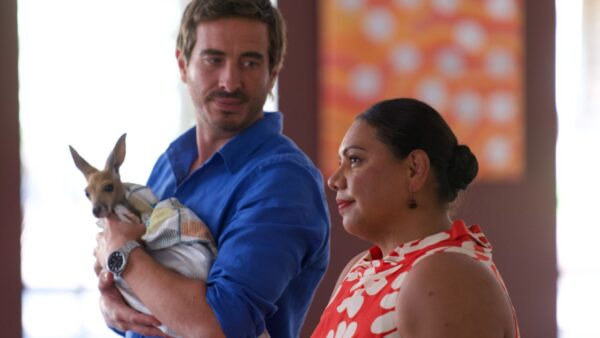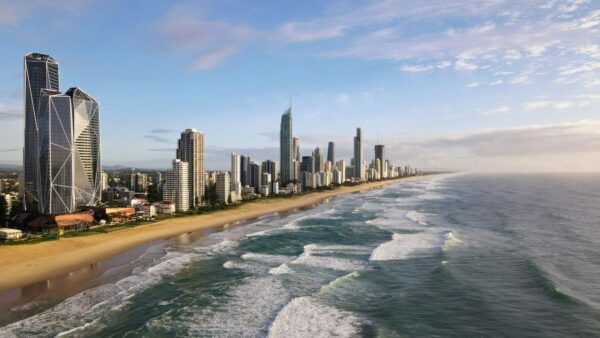As specialists in entertainment and production travel, TAG is committed to keeping sustainability at the heart of its business. The global team recognises their duty to protect local communities and the environment, while fostering positive environmental and social impacts across operations, supply chains, and the communities that the company serves. TAG was a finalist in the sustainability category of the National Travel Industry Awards (NTIA) in October.
With productions increasingly focusing on sustainable practices, TAG is helping clients meet their environmental goals. Travel is often one of the most significant contributors to a production’s carbon footprint and TAG is helping transform how productions approach sustainable travel.
To explore this topic further, Ausfilm spoke with two of TAG’s sustainability experts. Special Projects Manager Alexe Wallace shared TAG’s sustainability commitments and the meaningful actions being taken to drive change. Alexe is also a finalist for the Sustainability category at the Women in Travel Awards, with winners announced in December. Senior Account Manager Prue Kennedy, who has worked with numerous productions, provided insights into sustainability trends and best practices in production.

Wallace on TAG’s Commitment and Actions
What is TAG’s commitment to sustainability?
Sustainability drives our decisions and operational practices, underscoring our dedication to making a meaningful difference globally. Our environmental and social responsibilities are at the forefront of our strategy, cultivating a philosophy of sustainability that benefits our clients, communities, and the planet.
TAG APAC has proudly been a member of the EarthCheck Environmental Sustainability Program since 2020. EarthCheck is the world’s leading science-based environmental certification and benchmarking program for the travel and tourism industry, holding TAG accountable for making measurable progress on sustainability initiatives.
Through EarthCheck, we track and report year-on-year data across key areas, including electricity usage, water consumption, waste management, cleaning and paper products, and locally sourced procurement. As a bronze-certified member in all APAC offices, we are committed to achieving silver certification by building upon our sustainability efforts.
We monitor our carbon emissions across three distinct scopes:
- Scope 1: Direct emissions, such as energy use within our offices and emissions from company vehicles
- Scope 2: Indirect emissions from the electricity we purchase
- Scope 3: Indirect emissions generated by external processes and suppliers, which often represent the largest share of an organisation’s total carbon footprint
Scope 3 emissions present the biggest challenge due to their complexity but are vital to address. For TAG, these include:
- Emissions from office purchases
- Waste management, including landfill reduction and recycling efforts
- Use of biodegradable and non-toxic cleaning products
- Business travel emissions
- Implementation of green initiatives to reduce overall environmental impact
To assist our efforts, TAG has created a dedicated Green Team to refine our sustainability practices and exploring new ways to make a positive impact.
What meaningful changes has TAG implemented to demonstrate its commitment to sustainability?
We’ve embedded sustainability into our workplace culture, led by our dedicated Green Team, who help enhance employee well-being and foster a more sustainable and inviting work environment.
Here’s some of what we’ve achieved so far:
Office Organics Bin: We’ve introduced a dedicated organics bin to reduce landfill waste, lower greenhouse gas emissions, and sustainably dispose of food scraps and compostable materials.
Battery Recycling Station: This initiative ensures the safe disposal of hazardous materials, prevents environmental contamination, and supports the recovery of valuable resources for reuse.
Printer Cartridge Recycling: Partnering with Close the Loop, we’ve implemented a printer cartridge recycling system that promotes responsible disposal, reduces landfill waste, and embraces a circular economy by repurposing materials.
Community Support Initiatives: Through raffles and charity events, we’ve supported causes like The Canopy Project, contributing to reforestation efforts, raising environmental awareness, and engaging our community in impactful action.
Creative Recycling Projects: We’ve encouraged employees to donate unused bras to Support the Girls and sports shoes to Tread Lightly. These programs promote recycling, divert waste from landfills, and support vital social and environmental causes.
In addition, to mitigate climate change impacts, we offset all business travel, including flights and cars, through South Pole, The Climate Company.
How have these initiatives been received by clients?
Feedback from our clients on our sustainability efforts has been very positive. Our agents are extensively trained and knowledgeable about accommodations that are BCorp certified, EarthCheck certified, or part of other reputable sustainability programs.
To encourage our clients to embrace sustainability, we offer comprehensive carbon emission reporting. This service enables clients to offset the carbon footprint of their travel, including flights, car hire, and hotel stays. This expertise allows us to guide clients towards more eco-friendly choices, ensuring that their travel decisions align with their sustainability goals.
As a result, the majority of our production and corporate clients, along with an increasing number of clients across all divisions, have requested these reports. This positive trend continues to grow as more clients recognise the importance of sustainable travel practices.
What have been the positive impacts of these changes?
Through our partnership with Southpole, TAG APAC has offset more than 76 tonnes of carbon emissions by supporting The Mount Sandy Conservation project. This initiative fosters partnerships between Traditional Landowners and non-Indigenous Australians to undertake vital conservation efforts. We chose this South Australian project because it aligns closely with our company objectives and our commitment to fostering collaborative, sustainable practices.
In addition, we’ve offset 120.72 tonnes of emissions to the restoration of Kilómetro 120 Ejido for future generations. Located in the Mesoamerican Biological Corridor, this area is renowned for its rich natural and cultural heritage and, due to its proximity to the Calakmul Biosphere Reserve, boasts high biological diversity. Mexico holds a special place in our hearts, as we regularly work within the Mexican market.
Our efforts have also reduced landfill waste, lowered our carbon emissions, improved resource recovery, and increased environmental awareness among employees. Additionally, these initiatives foster a sense of community, support meaningful causes, and contribute to a healthier, more sustainable workplace.
What future sustainability goals or initiatives is TAG currently working on?
We are passionate about investing time and resources into improving our environmental and socially sustainable practices and are motivated by the improvements we make every day. This commitment not only benefits the planet but also helps retain our staff and fosters the culture we pride ourselves on.
We are working closely with Earthcheck to achieve our silver membership and continue to make a difference. TAG is committed to progressing through the EarthCheck program, working diligently to move from our current bronze certification toward a silver certification. This next level signifies independently-verified practices that meet EarthCheck’s rigorous sustainability standards and demonstrate measurable progress in reducing our environmental impact.
Achieving a silver certification requires significant effort, including a detailed governance process that covers:
- Compliance obligations and adherence to international standards
- Risk assessment and robust emergency planning and response protocols
- Implementation of a long-term sustainability management system and energy efficiency approach
- Development of a sustainability action plan that includes clear targets and objectives for environmental, social, cultural, and economic performance
TAG is also focusing on a comprehensive communications strategy to engage and inform stakeholders about our environmental policies, sustainability programs, and ongoing initiatives. This ensures transparency and shared commitment as we strive for continuous improvement.

Kennedy on Sustainability Trends and Production Insights
What is currently the trend in sustainability for productions?
Productions are increasingly recognising the importance of minimising their environmental and social impact, with a strong focus on reducing their carbon footprint. As travel remains one of the largest contributors to emissions, many productions are reviewing their travel practices to align with sustainability goals.
What are the most common sustainability requests?
A trend in sustainability for productions is the growing demand for environmentally-friendly transportation options. Productions are increasingly requesting hybrid and electric vehicles (EVs) to meet their logistical needs, reflecting a broader industry shift toward reducing emissions and embracing greener alternatives.
How does TAG help productions become more sustainable?
TAG supports productions in achieving their sustainability goals by providing comprehensive reporting on carbon emissions across travel and accommodation, enabling informed decision-making and offsetting opportunities.
Using the RDC methodology, we assess emissions based on city pair routes, class of travel, aircraft type, and seating configurations. This provides a detailed breakdown of the total kilometres flown and associated CO₂ emissions.
We also collect hotel data using the DEFRA method, calculating emissions based on the country of the hotel, room nights, and other relevant factors.
For car rentals, we use vehicle category codes, fuel type, and average kilometres driven per day to determine carbon output.
These reports are printed on request at the wrap up stage of a production; however, we can tailor reports to match what the production company or studio requires and communicates at the beginning of the production.
Can you share a recent example of how TAG supported a production in achieving its sustainability goals?
TAG has been actively engaging with SIXT and AVIS to advocate for an expanded fleet of EV and hybrid vehicles. Both companies have highlighted that hybrid vehicles remain the most requested option, largely due to Australia’s vast travel distances and the current limitations in charging station infrastructure. However, this landscape is evolving, with both SIXT and AVIS committing to prioritising hybrid vehicles as a key focus in their future fleet acquisitions.
In addition to these efforts, TAG has introduced a comprehensive sustainability focus into our 2025 hotel rate negotiation process. As part of our rigorous RFP framework, we’ve implemented a detailed screening questionnaire that hotels are required to complete. This allows us to evaluate their sustainability practices and reporting capabilities. Based on their responses, hotels will be graded in our directory, reflecting their commitment to environmentally-friendly operations.
How do you see sustainability priorities evolving for productions in the next few years?
Productions today carry an environmental, social, and economic responsibility to prioritise the well-being of the communities where they film. However, the travel segment of the industry has been slower to adopt sustainable practices due to the location-specific and time-sensitive demands of cast and crew logistics.
Through our vigorous reporting, we are able to provide productions with a full schedule of their carbon footprint, meaning they can choose to ‘give back’ to certain locations or countries they have visited.
To learn more about TAG’s efforts to drive greener travel, visit their website or reach out to [email protected]





